
Call of Cthulhu is a horror fiction role-playing game based on H. P. Lovecraft's story of the same name and the associated Cthulhu Mythos. The game, often abbreviated as CoC, is published by Chaosium; it was first released in 1981 and is in its seventh edition, with licensed foreign language editions available as well. Its game system is based on Chaosium's Basic Role-Playing (BRP) with additions for the horror genre. These include special rules for sanity and luck.

The Cthulhu Mythos is a mythopoeia and a shared fictional universe, originating in the works of American horror writer H. P. Lovecraft. The term was coined by August Derleth, a contemporary correspondent and protégé of Lovecraft, to identify the settings, tropes, and lore that were employed by Lovecraft and his literary successors. The name "Cthulhu" derives from the central creature in Lovecraft's seminal short story "The Call of Cthulhu", first published in the pulp magazine Weird Tales in 1928.

Cthulhu is a cosmic entity created by writer H. P. Lovecraft. It was introduced in his short story "The Call of Cthulhu", published by the American pulp magazine Weird Tales in 1928. Considered a Great Old One within the pantheon of Lovecraftian cosmic entities, this creature has since been featured in numerous popular culture references. Lovecraft depicts it as a gigantic entity worshipped by cultists, in the shape of a green octopus, dragon, and a caricature of human form. The Lovecraft-inspired universe, the Cthulhu Mythos, where it exists with its fellow entities, is named after it.
Miskatonic University is a fictional university located in the fictional town of Arkham in Essex County, Massachusetts. It is named after the Miskatonic River. After first appearing in H. P. Lovecraft's 1922 story "Herbert West–Reanimator", the school appeared in numerous Cthulhu Mythos stories by Lovecraft and other writers. The story "The Dunwich Horror" implies that Miskatonic University is a highly prestigious university, on par with Harvard University, and that Harvard and Miskatonic are the two most popular schools for the children of the Massachusetts "Old Gentry". The university also appears in role-playing games and board games based on the mythos.

"The Call of Cthulhu" is a short story by American writer H. P. Lovecraft. Written in the summer of 1926, it was first published in the pulp magazine Weird Tales in February 1928.

Delta Green is a contemporary era setting for the Call of Cthulhu role-playing game created by Adam Scott Glancy, Dennis Detwiller, and John Scott Tynes, a.k.a. the Delta Green Partnership, of the Seattle gaming house Pagan Publishing. The setting first appeared in a 1992 RPG scenario and revolves around a secretive organization tasked with protecting the United States from paranormal and alien threats. Delta Green combines the classic 1920s Cthulhu Mythos of H.P. Lovecraft with modern conspiracy fiction.

Call of Cthulhu: The Card Game is an out-of-print card game produced and marketed by Fantasy Flight Games. It is based on Chaosium's Call of Cthulhu role-playing game, the writings of H. P. Lovecraft, and other Cthulhu Mythos fiction. In 2008, Fantasy Flight moved the game over to its Living Card Game (LCG) format, which retains the deck-building aspect of collectible card games, but without the random distribution.
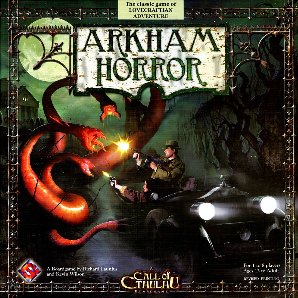
Arkham Horror is a cooperative adventure board game designed by Richard Launius, originally published in 1987 by Chaosium. The game is based on Chaosium's roleplaying game Call of Cthulhu, which is set in the Cthulhu mythos of H.P. Lovecraft and other horror writers. The game's second edition was released by Fantasy Flight Games in 2005, with a third edition in 2018.

Lovecraftian horror, sometimes used interchangeably with "cosmic horror", is a subgenre of horror fiction and weird fiction that emphasizes the horror of the unknowable and incomprehensible more than gore or other elements of shock. It is named after American author H. P. Lovecraft (1890–1937). His work emphasizes themes of cosmic dread, forbidden and dangerous knowledge, madness, non-human influences on humanity, religion and superstition, fate and inevitability, and the risks associated with scientific discoveries, which are now associated with Lovecraftian horror as a subgenre. The cosmic themes of Lovecraftian horror can also be found in other media, notably horror films, horror games, and comics.
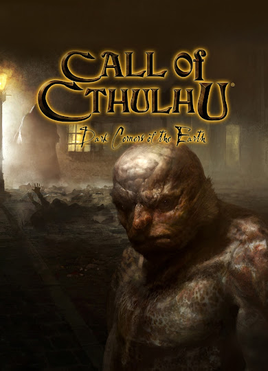
Call of Cthulhu: Dark Corners of the Earth is a survival horror video game developed by British studio Headfirst Productions for the Xbox in 2005 and for Microsoft Windows in 2006. It combines an action-adventure game with a relatively realistic first-person shooter and elements of a stealth game.
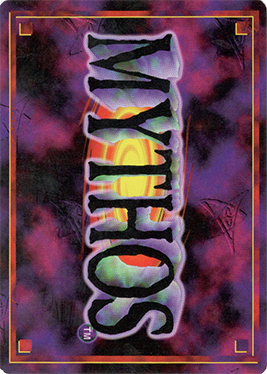
Mythos is an out-of-print collectible card game published by Chaosium. It is based on the Cthulhu Mythos stories of the horror author H. P. Lovecraft, as well as on Chaosium's own Call of Cthulhu role-playing game.
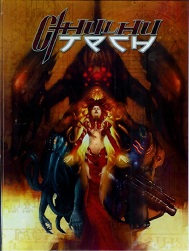
CthulhuTech is a science-fiction and horror roleplaying game created by Wildfire LLC and published by Sandstorm that combines elements of the Cthulhu Mythos with anime-style mecha, horror, magic and futuristic action. The setting is Earth in 2085 during a worldwide conflict known as the Aeon War, wherein the planet has been invaded twice: once by a black-skinned manufactured alien race known as the Nazzadi who are derived from humans and who join forces with them, and then a second time by the Mi-Go, an advanced alien civilization seemingly bent on the enslavement of humanity. Aside from these conflicts, the game focuses on other factions, such as ancient cults like the Esoteric Order of Dagon that are running amok across the planet and the eldritch horrors that are rising to destroy the world as, according to the prophecies of the Cthulhu Mythos, the "stars are right" and the Great Old Ones and their servitors are returning/reawakening to reclaim the Earth. The game uses a proprietary ten-sided die (d10) system titled "Framewerk."

Trail of Cthulhu is an investigative horror role-playing game published by Pelgrane Press in 2008 in which the players' characters investigate mysterious events related to the Cthulhu Mythos. The game is a licensed product based on the horror role playing game Call of Cthulhu published by Chaosium, which is itself based on the writings of H. P. Lovecraft.

This article provides a list of cultural references to the work of author H. P. Lovecraft. These references are collectively known as the Cthulhu Mythos. For works that are stylistically Lovecraftian, including comics and film adaptations influenced by Lovecraft, see Lovecraftian horror.
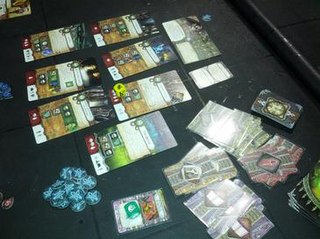
Elder Sign is a cooperative card and dice game, based on the Cthulhu Mythos of horror writer H.P. Lovecraft and Chaosium's Call of Cthulhu roleplaying game. It is published by Fantasy Flight Games, which also produces the Cthulhu Mythos games Arkham Horror, Call of Cthulhu: The Card Game, Mansions of Madness, and Eldritch Horror.

The NecronomiCon Providence, also known as the NecronomiCon Providence: The International Conference and Festival of Weird Fiction, Art, and Academia, is a biennial convention and academic conference held in Providence, Rhode Island. It explores the life and works of H. P. Lovecraft and other creators of weird fiction, film, and art of the past and the present. Originally billed as "the largest celebration ever of [Lovecraft's] work and influence", it has broadened its scope to examining and celebrating weird creative efforts internationally. The event is typically held on the weekend closest to Lovecraft's birthday of August 20th.
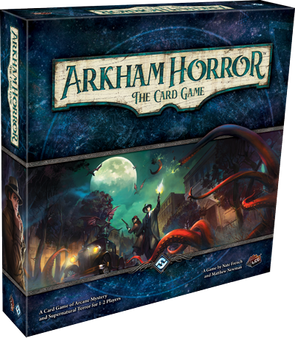
Arkham Horror: The Card Game is a cooperative living card game produced by Fantasy Flight Games. It is set in the universe of Chaosium's Call of Cthulhu roleplaying game which is itself based on the Cthulhu Mythos of H.P. Lovecraft and other cosmic horror writers. The title refers to Lovecraft's fictional town of Arkham, Massachusetts which is mentioned in many Mythos stories.

Achtung! Cthulhu Tactics is a turn-based tactics video game developed by Auroch Digital and published by Ripstone Games and Modiphius Entertainment. It is an adaptation of Modiphius' Achtung! Cthulhu tabletop game.
The Lovecraft fandom, Lovecraftian fandom or Cthulhu Mythos fandom is an international, informal community of fans of the works H. P. Lovecraft, especially of the Cthulhu Mythos and the Lovecraftian horror.













